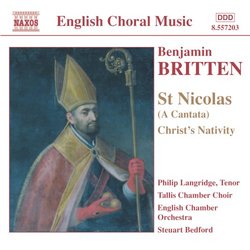A Worthy Successor to a Much Earlier Britten/Pears Recording
J Scott Morrison | Middlebury VT, USA | 07/13/2004
(5 out of 5 stars)
"I have particular interest in the main piece on this CD, Britten's 'St. Nicolas' cantata, because a choir I sing in will be doing it later this year with our local professional chamber orchestra; interestingly, a previous performance of it by this group was so successful that a repeat has been requested. Britten, of course, wrote the work for amateur chorus and a professional tenor soloist, in this case his long-time lover, Peter Pears. Enough time has now passed that, although Pears/Britten recorded the work, it is appropriate and welcome that new forces give it a go. Philip Langridge, the tenor here, is actually a better-sounding singer than Pears, although no one would ever question Pears's musicianship. And I say that even as I am one of those who long since have found Pear's idiosyncratic voice to be more than acceptable. This performance was issued earlier (mid-1990s, I think) on the now-defunct Collins Classics label. Naxos apparently has obtained license to re-release a number of Collins Classics recordings of Britten's music; I've raved about earlier releases of 'Albert Herring' and 'The Turn of the Screw.' Steuart Bedford, the conductor on all these releases, is certainly the reigning Britten conductor, having succeeded Britten at the helm of the Aldeburgh Festival.'St. Nicolas' tells the story of an early church saint, Nicolas, the 4th-century Bishop of Myra, not 'jolly Saint Nick' but another fellow entirely. Not much is known about him so librettist Eric Crozier had leeway to invent much, drawing on the legends surrounding him. Among the interesting episodes is the charming (and weirdly grisly) story of 'Nicolas and the Pickled Boys.' Most moving is the penultimate episode, 'His Piety and Marvellous Works.' Most immediately appealing is the jaunty 'Birth of Nicolas.' Britten asked the congregation to join in at two points when the choir is singing straightforward arrangements of the hymns, 'All people that on earth do dwell' (the 'Old 100th' doxology tune) and, at the end, 'God moves in a mysterious way.' The choir is the magnificent Tallis Scholars, accompanied by the English Chamber Orchestra under Bedford. This is a fervent, lively, moving performance, marked by sometimes catchy, sometimes solemn and always expertly crafted choral/orchestral mix. There is little choose between it and Britten's earlier recording (except Naxos's exceptional price). The other two works are a very early work, the a cappella 'Christ's Nativity' (from 1931, when Britten was still at the Royal Conservatory) and 'Psalm 150,' an occasional piece written for Britten's old school, Lowestoft. The former is performed by the BBC Singers. The latter is a joyful work and fun to hear throughout it's four-minute length. It is sung by the New London Children's Choir accompanied by the London Schools Symphony Orchestra. TT=66:00Scott Morrison"


 Track Listings (15) - Disc #1
Track Listings (15) - Disc #1